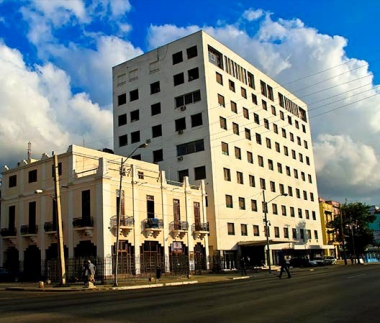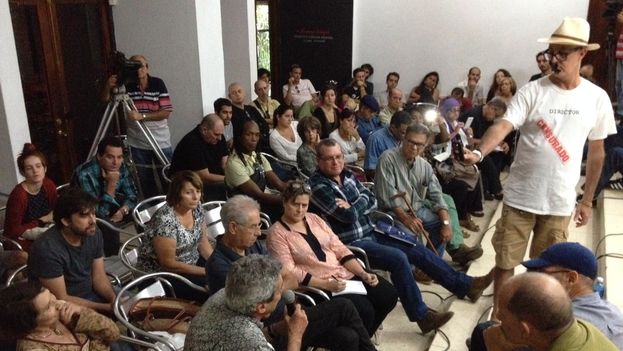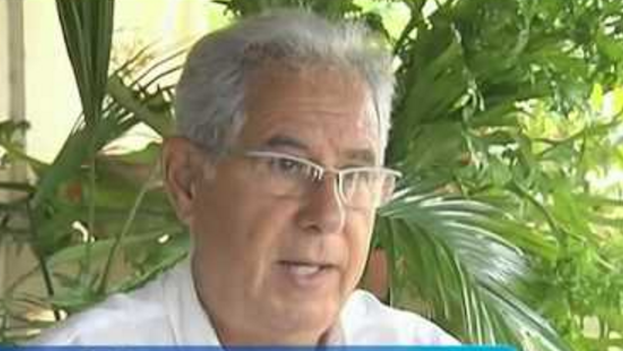If we consider the rectifications and rescues of cultural works and personalities that were once stigmatized with the counterrevolutionary sanbenito by officials and leaders of a rigid and dogmatic orthodoxy – on occasion fractured by a corrupt and opportunistic, or simply inconvenient, act within a centralized and vertical structure of power, which led them to be separated and condemned to political ostracism – the list would be long. Today the injustices committed during the so-called Five Gray Years are officially recognized, and the reparations, repairs and appropriation of our cultural legacy is often realized when its authors have already disappeared, moreover of those who had to emigrate, but for those who left because of criticism, warnings and the denunciation in their works the authoritarian and intolerant drift of the systemic bureaucracy, for those “rescued” they have to be dead already.
Intolerance to criticism as a rule to know the truth – which is inherent in the artistic phenomenon that explores, investigates and scrutinizes human conflicts, socially, politically and economically framed in its reality and its history – has been and continues to be a projection of a fear to face the responsibilities emanating from a bureaucratic power that has made mistakes, and suffered losses and deviations from its original revolutionary and libertarian impulse.
Mistakes and absurdities motivated on occasion by a chimerical immobility incapable of adapting and overhauling the utopia to meet the urgent requirements of a reality in need of an objective, sensible and balanced assessment of the causes of its defects in order to correct and amend them. Rather, and despite, the cyclical openings of rectification and the calls to public criticism against what has been done badly in these 56 years, attention was always focused on the phenomena and not the causes.
Thus the absence of a systematic critical confrontation through the media, subjected to a castrating censorship, has ended up forging the sacredness and untouchability of the vertical decisions of power, although it tries to mask them with participative consultations to touch up the make-up.
There is already a stagnation in public awareness and an ideological exhaustion from the worn out propagandistic character of the media that support an opaque future reality and provoke this apathy and escapism that so concerns those who are worried about the ideological diversionism, superficiality and banality of the entertainment people seek in the “weekly packet,” the computer games, and reggaeton music…
This loss of values, bad education, vulgarity, social indiscipline… are also the result of not having promoted and nurtured in public practice that rebellion and autonomy of opinion that Che encouraged against all the liars and opportunists who preach the dictates of discretion, caution and restraint in the expression of our non-conformist citizens. Disagreement as a lawful civil right to express an opinion without being reprimanded through this inoculation of fear in the face of the consequences of expressing a critical point of view in “an inappropriate place, at an inopportune moment, and in a politically incorrect manner.”
Movies, plays and artworks … have suffered the brunt of this reactionary hangover that rejects the debate of ideas
Movies, plays and art works have contributed with many of their creations to confronting us with this wall of silence protected by the ideological gatekeepers who censor and condemn in the name of the defense of the Revolution when in reality what they do is undermine the humanist pillars of its continuity. Movies, plays and artworks – without forgetting the period of prohibition suffered by the best exponents of the Nueva Trova who ultimately became the most authentic singers of the Revolutionary work – suffered the brunt of this reactionary hangover that rejects the debate of ideas and crouches in the stone trenches to launch their poisonous inquisitional darts.
Recently — and in contradiction to the appeal made by the government’s highest authorities to face reality with a critical eye, honesty and ethical commitment, recognizing that unanimity of opinions is a fallacy of simulation — they have launched attacks against a writer whose literary work and journalism is an example of seriousness and sincerity recognizing our current material and spiritual scarcities, in addition to being a genuine exponent of a committed and authentic Cubanness.
I’m talking about Leonardo Padura and also referring to the stupid ban on the movie based on his novel, Return to Ithaca, which months later was shown during French Cinema week, more to keep up appearances than as recognition of the error of arrogance committed. Stupid because it shamelessly exposed the fangs of the crouching dogmatic beast just to create a problem that discredits not only its own maker but the power it represents.
Because it is understood that more than strength, such intolerant behavior expresses the weakness and the intellectual and political intolerance for open and responsible debate with reasons and arguments that nourish a shared confidence to seek solutions to the problems denounced in the work, so that this sad history is not repeated, a history of encouraging this “revolutionary” combativeness with a propensity to gag thinking and make a paranoid sickness of the logical precaution that assumes a change like that which is being produced in our country. Healthy change, not only of the intentions to keep everything the same, but to expunge this inability to see ourselves in an uncomfortable mirror, to recognize our imperfections and to question the historic deficiencies in the systemic structure of the model that encourages them.
Such intolerant behavior expresses the weakness and the intellectual and political intolerance for open and responsible debate
Thus, I finally get to the starting point that motivated me to write these lines: the prohibition of the play by Juan Carlos Cremata and the suspension of his employment as a theater director. This brought me to remember those years when the Cuban theater, that had reached its splendor with the Revolutionary triumph, suffered that purifying “parameterization” with its aberrant and repressive prejudices that resulted in frustration, ostracism and exile for creators and artists who were only enriching with their art the cultural patrimony that we know constitutes the support and sustenance of our national identity.
I am not telling the story nor mentioning names overwhelmed by that outrage which I consider truly shameful and counterrevolutionary, which only brought discredit to a Revolution that some extremists with the power of decision interpreted the aspiration to create a New Man with that of creating an obedient robot, dogmatic and filled with reactionary prejudices, today under attack but not exterminated. Nor will I stop to argue about the work in question which one can agree with or not, like its staging or not… no, I only want to point out that I consider it inappropriate for some – who are not artists nor have they contributed anything to the national culture – to again set themselves up as inquisition judges and who, yoked to an ephemeral authority, decide to frustrate the fate of an artist, of a creator whose work in the cinema and the theater is already the patrimony of our culture.
There may be contradictions and wherever a theater director can decide whether or not to present a work, whether to suspend or continue its representation, the anomalous case is that if there was prior supervision with respect to its content or staging, the responsibility the censors have in the situation created after the premiere.
The theater in Cuba is under by the Ministry of Culture and responds to a political culture whose tuning fork should be as broad as the recognition of the national audience’s capacity of discernment, an audience officially recognized for its educational, political and cultural level. So why, then, the censorship of the adaptation and staging of a play that itself contains great provocation, perfectly compatible with the shock factor of an art that tries to break taboos, move us and make us think, to take sides in favor or against their proposal?
Do we or do we not have an educated and committed audience with revolutionary ideas and principles capable of drawing their own conclusions to approve or reject it? What is the real constructive sense of an exclusive censorship without mediating a debate among those who undertake this artistic activity who are potentially subject to this same arbitrariness?
Some extremists with the power of decision interpreted the aspiration to create a New Man with that of creating an obedient robot, dogmatic and filled with reactionary prejudices
When, 25 years ago, censorship was dictated against Daniel Diaz Torres’s Alice in Wonderland, and direction was given to the militants of the Provincial Party, headquartered at M and 23rd, to go to the Yara Cinema during its showing to “cut off at the pass any manifestation of counterrevolutionary approval.” On the front page of the newspaper Granma an official note appeared where it was announced that the Council of State decided that the Institute of Cinematographic Art and Industry (ICAIC) would be under the supervision the Cuban Institute of Radio and Television (ICRT). This meant that the National Film Institute lost the relative autonomy of political decision-making for the approval of film production, which until then had allowed them to do documentary film production and today could be considered as a diagnosis of the evils of the Special Period which worsened to point of sounding the alarm on the urgent need to make the changes and openings that today are so long delayed.
At that time we filmmakers gathered to protest against that decision that discredited the film, its director and dissolved the ICAIC. The film was not counterrevolutionary, nor was its director nor any of those who went down on their knees to defend the artistic space with critical proposals, all lined up against the bureaucratic authoritarian and reductive abusive interventionism, exactly like that which caused the so-called desmerengamiento* (total collapse) of the Socialist Camp. (Because it was the same hammer and sickle that brought down the Berlin Wall, and it is worth saying that it was because of disbelief and the political dysfunctionality of the Socialist model, in whose womb, worn out and corroded, lay the revolutionary essence of its origin.)
What is the real constructive sense of an exclusive censorship without mediating a debate among those who undertake this artistic activity who are potentially subject to this same arbitrariness?
There were directors like Santiago Alvarez, Tomas Gutierrez Alea and others who, with their artistic careers, supported the continuity of this critical slope that always confronted the harassment and repudiation of those keepers of the chalice, pristine and pure, of that ideology without supreme saviors, without Caesar or bourgeoisie or God… today we say a controversy in the practical application of the laws of dialectics. And, thanks to this resistance they would keep making movies that never turned their backs on reality and that today maintain intact their rebellion against bureaucratic ukases and diktats.
So our protest is also confirmed by the pretension of excluding us from decision-making in the supposed restructuring of the ICAIC and the insistence, for more than two years, in the belief in a Film Law that guarantees the recognition of an independent production and a movie institute that promotes and protects national filmmaking and not one that monopolizes and controls it, because there is no… (There is an official claim of legitimate institutions eroded by a future that has exceeded its capacity for functional readjustment to meet new demands imposed by a very distinct present very different from that which motivated its origin. See the documentary, “Put me on the list…”)
The Cremata case falls within the ideological debate which has marked the destiny of a process that needs to keep alive the historic memory of its cultural work so as not to continue committing and supporting errors that put this valuable cultural treasure in danger, a critical thermometer that no censorship will be able to disconnect while we are able to act in consequence and committed to our civic duty.
*Translator’s note: Desmerengamiento was coined by Fidel Castro to embody, in a single word, the debacle of the Soviet Union. It comes from the word “meringue” and, like a failed meringue, refers to the idea of a complete collapse.



